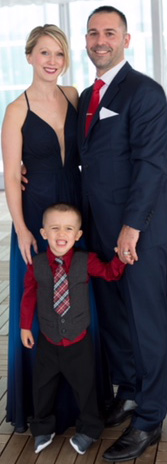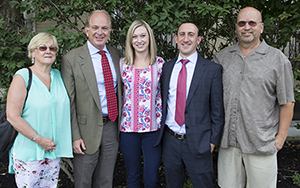Life-Saving Cardiovascular Care in the Nick of Time
BIDMC Contributor
AUGUST 14, 2018
 This September, 33-year old Ashley Lucchese will participate in her second Boston Heart Walk. The former BIDMC patient learned first-hand the importance of CPR training, advanced cardiovascular care and ongoing research for saving lives—even her own.
This September, 33-year old Ashley Lucchese will participate in her second Boston Heart Walk. The former BIDMC patient learned first-hand the importance of CPR training, advanced cardiovascular care and ongoing research for saving lives—even her own.
On March 10, 2017, Ashley was at work in Peabody when she told a coworker she felt dizzy. Within seconds, she fell on the floor, unconscious and in cardiac arrest. “By chance, my coworkers had just completed CPR training two days before,” she says. “My manager ran in and began compressions until paramedics arrived.”
The paramedic team transferred Ashley to a nearby hospital while continuing to try to bring Ashley’s heart back to normal rhythm. About a half-hour later, Ashley’s pulse was restored—but the outlook was not good. She was transferred to BIDMC’s intensive care unit.
“I was placed into a medically-induced coma and my family was instructed to not venture far from the unit,” she says. “As my medical team worked to find the source of internal bleeding, my family was preparing for the worst.”
After six long days and an exploratory abdominal surgery later, Ashley began showing signs of improvement and was taken out of the coma. “I was scared to go to sleep at night for fear of not waking up,” she says.
As she recovered and gained strength, Ashley underwent a series of cardiac tests, which showed her heart rhythm had improved. “It wasn’t exactly what you’d expect to hear after your heart stopped beating the week before,” she says. “I was exhausted but determined because I wanted to get home to my son, Connor.”

Daniel Kramer, MD, of BIDMC’s CardioVascular Institute, performed surgery to place an implantable cardioverter defibrillator on Ashley’s heart. This battery-powered device keeps track of your heart rate—and if an abnormal heart rhythm is detected, delivers an electric shock to restore a normal heartbeat.
“After 17 long days, I was discharged and headed home to my son, who celebrated his second birthday while I was in the hospital,” Ashley says.
A few months later, Ashley began not feeling well once again. Together with Elad Anter, MD, Kramer discovered that Ashley’s heart was experiencing many premature ventricular contractions (PVCs), or extra, abnormal heartbeats. After another surgery—this time to correct electrical signals causing abnormal heart rhythm—Ashley came home, finally feeling closer to her normal self.
“I’ve never been a lucky person but I truly believe that I am now the luckiest person in the world because I am alive and able to spend more time with my family,” she says. “I owe all of this to my amazing team at BIDMC.”
Ashley set out on a mission to raise awareness about CPR training and the research and clinical programs of the American Heart Association (AHA). She participated in the AHA’s 2017 Boston Heart Walk with “Ashley’s Army,” thrilled to see Team BIDMC in full force—who was recognized by the city as the top fundraising hospital.
“Seeing the BIDMC Heart Walk team reaffirmed what a special place this is for me,” she says. “I’m so proud to walk alongside so many staff, family and friends who want to give back to a place that’s given me so much.”
About Beth Israel Deaconess Medical Center
Beth Israel Deaconess Medical Center is a leading academic medical center, where extraordinary care is supported by high-quality education and research. BIDMC is a teaching affiliate of Harvard Medical School, and consistently ranks as a national leader among independent hospitals in National Institutes of Health funding. BIDMC is the official hospital of the Boston Red Sox.
Beth Israel Deaconess Medical Center is a part of Beth Israel Lahey Health, a health care system that brings together academic medical centers and teaching hospitals, community and specialty hospitals, more than 4,700 physicians and 39,000 employees in a shared mission to expand access to great care and advance the science and practice of medicine through groundbreaking research and education.
